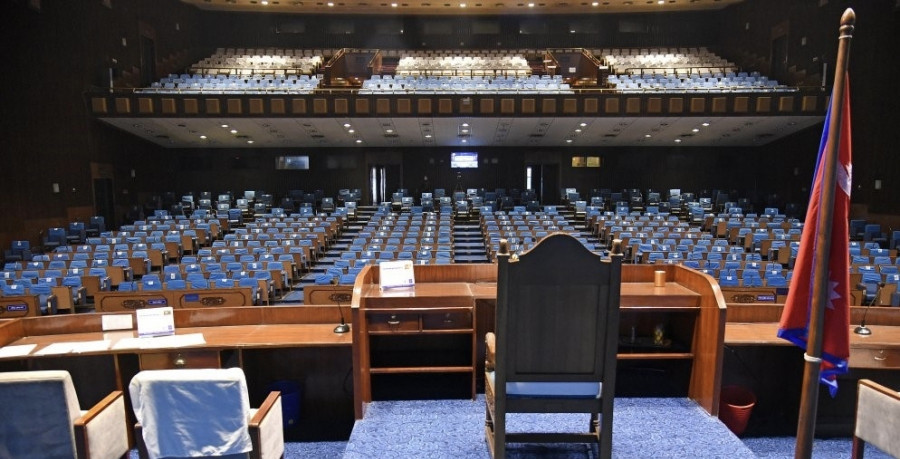Columns
The question of a directly elected executive
An executive elected directly by the people is not a panacea for Nepal’s ills.
Naresh Koirala
Gen Z is calling for an executive head of government (prime minister) in Nepal with term limits, directly elected by the people. The present Constitution prescribes an executive elected by the Parliament. The discussion on whether Nepal should opt for an executive head directly elected by the people or elected by the Parliament is not new. These propositions were hotly contested during the drafting of the current Constitution. The Maoists were in favour of a directly elected executive, whereas the Nepali Congress was in favour of an executive elected by Parliament. The UML changed its preference from directly elected to elected by the parliament following the discussion. Eventually, the drafters settled for the executive elected by the Parliament, and that is what we have now.
The primary demand of the September 8 protest was the ‘end of corruption’. The demand for a directly elected executive is predicated on the belief that corruption will not end with such an executive. The theory posits that a government headed by a directly elected executive will be stable, serve its full term, create an environment conducive to long-term economic development and discourage corruption. Whereas an executive elected by Parliament would invariably be the head of a coalition, which is inherently unstable. Unstable governments inhibit economic development and foster corruption.
A comparison of the levels of corruption in governments led by directly elected executives and those led by executives elected by Parliament, along with a stability check of some coalition governments, will test the validity of the above theory and help decide an objective way forward.
Comparison
Every year, Transparency International publishes the Corruption Perception Index (CPI) scores for 180 countries. The scores are based on the perception of corruption by experts and businesses in each country’s public sector. The CPI scores are widely accepted as the most reliable way to assess the comparative level of corruption around the world. A country with zero corruption receives a score of one hundred. In 2024, Denmark achieved the highest score, scoring 90. This shows there is no country absolutely free of corruption. Sudan scored 8, the lowest score. Nepal was at 34.
For comparison, I have selected 12 countries, six of which have directly elected executives (Category I) and six have executives elected by Parliament (Category II). Since no country has a directly elected prime minister, I have assumed countries with directly elected executives as equivalent. The Category I countries are France (67), the Philippines (33), Russia (22), Turkey (34), Sri Lanka (32) and the United States of America (67). Bangladesh (23), Canada (75), Denmark (90), Germany (75), India (38) and the United Kingdom (71) are in Category II. The numbers in parentheses beside each country indicate its CPI score. The comparison shows that the level of corruption in Category II countries is less than in Category I. A comparison of the economic performance of these countries, using the World Bank GDP data, yields the same conclusion: The economic performance of Category II is superior to that of Category I.
Regarding the stability of the government and economy, generally elected executives stay in power for the full term prescribed in the Constitution, thereby providing a stable government. However, as the corruption scores indicate, this stability does not necessarily result in a reduction of corruption. As I write this, Gen Z is protesting against public corruption in the Philippines, a Category I country. Sri Lanka was led by a directly elected President when anti-corruption protests erupted there. Also, of significance is to be aware that in some category countries, the directly elected executives have manipulated the elections to stay in power forever and turn themselves into pseudo dictators: Russia and Turkey are examples.
A stable government is essential for economic development. There is no argument. However, stability alone does not necessarily lead to economic advancement and a reduction in corruption. If it did, all countries in Category I and dictatorships would be the beacon of economic prosperity and devoid of corruption. Barring China, some of the most stable governments are also among the most corrupt and economically struggling. Take North Korea and Cuba. Remove oil and gas revenue, and the Russian economy will be in dire straits.
Coalition governments and instability
The facts do not support the claim that coalition governments are inherently unstable. Most of Europe is run by coalition governments, and generally, these governments serve the full term of office and have enviable economic success. The last time Germany had a one-party government was from 1957 to 1961. Germany became Europe’s economic powerhouse under a series of coalition governments. In Germany, the potential coalition partners agree on a common policy agenda and deliverables before sealing the coalition. Once the alliance is formed, despite their differences, the parties remain united throughout the term of office and work together to deliver their agreed-upon agenda.
Manmohan Singh’s coalition government in India lasted for 10 years. The Indian economy made its most significant leap during this period. In Canada, both Steven Harper and Justin Trudeau headed minority governments part of the time during their tenure in office, which lasted nearly 10 years. It is evident that coalition governments do not have to be unstable and economically stagnant, provided the leaders of the coalition act responsibly and with integrity.
The instability of Nepal’s coalition governments is due to the lack of commitment of its leaders to public accountability. Their priority is not public service, but self-enrichment and the enrichment of their party and cadres. Nepal’s coalitions do not have a publicly announced agenda. They do not collapse because of policy differences between the coalition partners, because there is no policy agenda; they collapse due to the clash of personal egos of the coalition leaders and disagreements in the leaders’ share in the appropriation of plum government positions, which party gets what position, Bhagbanda, as they say.
Going forward
An executive elected directly by the people is not a panacea for addressing Nepal’s ills. That is evident from the available data. Also, the narrative that coalition governments are inherently unstable is a myth. The risk of having a directly elected executive is huge. Imagine if Pushpa Kamal Dahal had been directly elected in 2008. There is a strong probability we would be living under a communist dictatorship if his attempt to appoint a Maoist sympathiser as the Chief of the Army Staff in 2008 had succeeded. At the time, the Maoists were still dreaming of the ‘dictatorship of the proletariat’. Witness the creeping authoritarianism in the United States under a directly elected executive.
Nepal’s answer going forward is to reject the current slew of septuagenarian and their sycophants in the next election if they do not go away voluntarily; to enact new laws to lower the cost of contesting elections; to ban people with previous criminal records and people under investigation for criminal acts from contesting elections; to enforce strict expense limits in elections; to make the government pay part of the election cost as it happens in Canada and several European countries; to appoint an ethics czar in the Parliament; to remove the mandatory requirement for a cabinet minister to be a member of parliament so that the prime minister can select suitable person for cabinet posts.
Finally, and this is perhaps the most important need, make internal democracy in political parties constitutionally mandatory. Had there been internal democracy within the UML, the party cadres would have checked KP Sharma Oli’s excesses. If the Nepali Congress president Sher Bahadur Deuba had listened to dissenting voices in the party, the Gen Z revolution may not have been necessary.




 13.12°C Kathmandu
13.12°C Kathmandu















